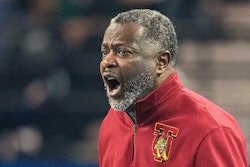When Keyontae Johnson, a 21 year old basketball player, agreed to play NCAA basketball at the University of Florida, he had no idea about the trauma that he would experience. Keyontae contracted COVID-19 in August and after passing physical screenings, he collapsed while playing basketball. He was then diagnosed with a rare heart disease that would impact him for the rest of his life. He was also placed in a medically induced coma as doctors fought to save his life. Luckily for Keyontae, he was able to recover and is back on the sidelines at the University of Florida while managing his heart condition. Many suspected that the heart condition was linked to COVID-19 and had concerns about NCAA athletes contracting the virus while playing sports.
A huge concern for Keyontae and many others is the NCAA’s failure to provide long-term medical care for athletes who are seriously injured and/or contract COVID-19 while playing NCAA sports. The massive revenue that the NCAA generates and its failure to provide long-term healthcare benefits shows the economic injustice that exists for NCAA athletes.
The NCAA generates $867.5 million annually on championship television and marketing rights and $177.9 million on tickets sales. The NCAA spends over $100 million dollars on legal services, communications, business insurance, and general and administrative expenses but has no requirement for a single dime to be paid on future healthcare or medical expenses for athletes who experience brain damage including CTE (a degenerative brain disorder that is common among athletes who have had concussions), suffer serious injuries, or contract COVID-19 while they were playing NCAA organized sports. The NCAA’s only policy covers catastrophic injuries and the bills for some of those injuries while the athletes are participating in NCAA organized sports, and not after graduation. Many athletes also lose their scholarships when they sustain these serious injuries and some have no financial means to finish their degree programs.
This issue is made worse when it becomes clear that the athletes who are generating this revenue, often to their own detriment, are often Black athletes from poor backgrounds. The National Bureau of Economic Research analyzed the revenues among 65 athletic departments at the NCAA’s highest revenue generating programs, Division I men’s basketball and football. Almost 60% of the athletes in these revenue generating sports programs are Black athletes who come from impoverished neighborhoods. The uncompensated labor of these athletes, many of whom do not have a financial safety net from their families, funds the NCAA.
The NCAA’s glaring refusal to pay for future medical expenses for injuries suffered while playing NCAA sports is made worse by the dismal rate for NCAA athletes to enter professional sports. For example, 1.2% of the men playing NCAA basketball and 0.8% of the women playing NCAA basketball enter the NBA and WNBA, respectively. The remaining 98.8% of these young men and 99.2% of these young women must balance their medical expenses and long-term healthcare without the financial resources that some assume would be available to them as professional athletes.
The NCAA has a lot of work to do to remedy the injustices of its enterprise where only 13% of men’s coaches and 14% of women’s coaches are minorities. The same system where some coaches make in excess of $9 million dollars a year and the athletes – and unpaid laborers – have historically lived below the federal poverty line. A system where many of these athletes leave college sports with medical debt, student loan debt, and no prospects of playing professional sports. In fact, only 1% of college athletes receive full scholarships and the remaining 99% often graduate with significant student loans.
As society continues to expose social injustices and issue calls to action, sports remain in the forefront of these discussions. For example, on December 20, 2020, Worth Rises, an advocacy group that is seeking to eradicate privatization and exploitation in the prison industry, took out a full page advertisement in the New York Times that calls for Tom Gores, the owner of the NBA’s Detroit Pistons, to sell his franchise because of his personal and professional involvement in the exploitation of prisoners.














